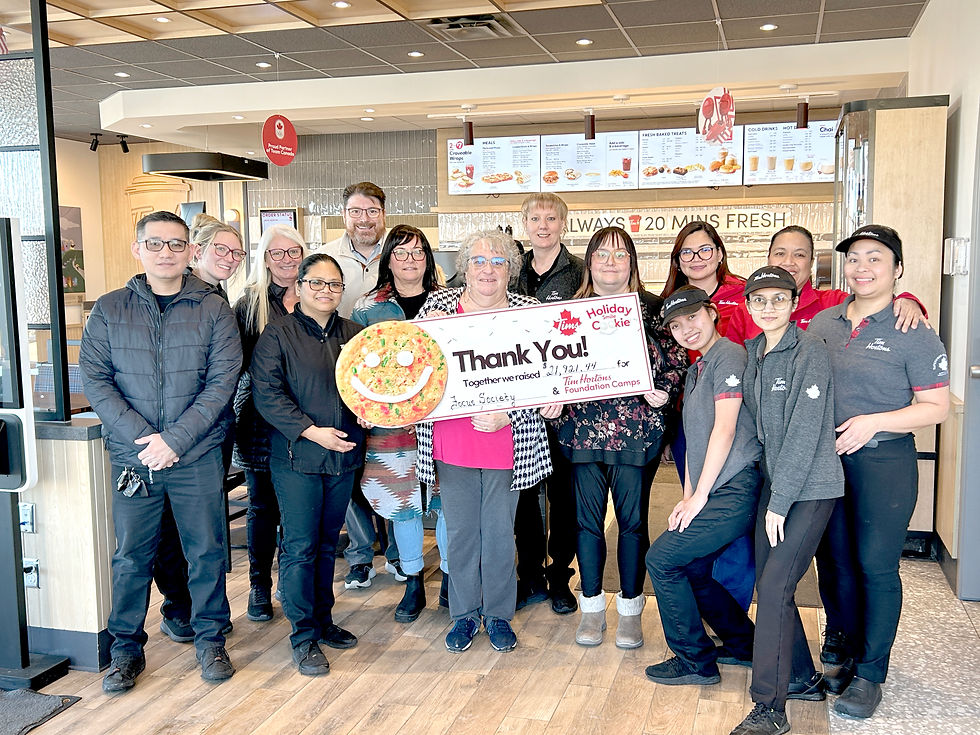Rural Crime Town Hall
- Vermilion Voice
- Oct 30, 2017
- 4 min read

Back row from left, Crown Prosecutor Jeff Rudiak, MLA Dr. Richard Starke, Cpl. Brad Mouland,
Sgt. Juan Huss, and Rural Crime Watch's Darrell Wright.
Front row from left, Tyler Lorenz, Sgt. Jane Boehr, and Victim Services' Heather Koroluk
at the Rural Crime Town Hall meeting in Mannville on October 25. Photo Angela Mouly
Sharing their concern, approximately 250 people gathered on October 25, as MLA Dr. Richard Starke held a Rural Crime Town Hall meeting.
The Mannville Agricultural Society assisted in hosting the event and providing refreshments. Constituents were eager to hear what the panel had to say and had a great deal of questions and suggestions on how to help the situation. The panel included RCMP members Sgt. Jane Boehr from Vermilion, Cpl. Brad Mouland from Viking, Sgt. Juan Huss from Kitscoty, Crown Prosecutor Jeff Rudiak, Rural Crime Watch’s Darrell Wright, Battle River Victim Assistance Society’s Heather Koroluk, and Lloydminster Men’s Shelter Administrator/ Outreach Worker and Smart Recovery Facilitator Tyler Lorenz.
“Not only are the incidents increasing but the brazen nature of the crimes is increasing as well as the tendency towards violence towards persons; not just property,” said MLA Dr. Richard Starke.
Starke plans to carry people’s concerns forward to the Justice Minister at the fall session of the Alberta Legislature.
Sgt. Jane Boehr shared that the Vermilion RCMP have seen an increase in incidents from an average of 48 reported in June, July, and August to 169 in the month of September. According to Boehr, another significant increase was seen in Kitscoty from 493 reported incidents from January – September of 2016, to 828 during the same period of 2017.
In order to address the rural crime and property offenses, Boehr ensured that members are making patrols as often as they can, conducting curfew checks, and have a comprehensive plan coming from Edmonton.
“The plan is not just to do enforcement, but to address the cause whether it is drugs, mental health, or organized crime. You are our eyes and ears,” said Boehr who suggested calling in serial numbers, plate numbers, and descriptions when witnessing suspicious activity.
Jeff Rudiak, Crown Prosecutor from St. Paul said, “Northeastern Alberta is the busiest crime wise in the whole province. It’s absolutely unbelievable how busy it is. We see more prohibitive or restricted weapons cases than ever before.
Even when a description and plates have been given, cases have been acquitted because sometimes the evidence just falls short. Under Section 35 of the Criminal Code, reasonable force is not defined; every situation is different.”
According to Rudiak, the five prosecutors in St. Paul each have 2,000 files on the go at any given time, and currently there are 10 murders cases on the go.
According to Darrel Wright, the Kitscoty Rural Crime Watch tries to solve crime, prevent crime, but most of all educate people on how they can help.
“RCMP members do a wonderful job, but they can’t be everywhere,” said Wright.
Tyler Lorenz shared unique insight as he has been both a victim and a perpetrator, has struggled with addiction and served time in jail, and has now turned his life around to be an active, contributing member of society as an administrator and outreach worker for the Lloydminster Men’s Shelter and Smart Recovery facilitator.
According to Lorenz, he drank heavily from the time he was a teenager and progressed in drug use during his 20’s and as a result lost his marriage, children, house, and employment. In hopes of change he moved to Victoria, but his life continued to fall apart and he became homeless and a heroin addict.
“Addiction will follow you wherever you go if it is not treated,” said Lorenz.
Lorenz said that his best friend and former business partner called his parents who flew him back to Lloydminster to attend a Thorpe Recovery program, but he only lasted one week and later moved to Calgary. He experienced regular brush-ins with the law and five years ago things really seemed to fall apart when he began using methamphetamines.
“It changed who I was as a person. I got into dealing, property crime, vehicle theft; all to feed my addiction. As an addict, the consequences were immaterial to me; jail time didn’t matter. Death is the ultimate consequence, and even that didn’t matter,” said Lorenz who had been stabbed and shot at.
Feeling that there is no support for addiction at the remand level, Lorenz advocated for better support for mental health and addictions so that people serving time aren’t released into similar environments with the same addictions they went in with.
“Those people are someone’s son or daughter. Sixty-six percent of incarcerated individuals have addiction issues, and the other third likely have mental health issues,” said Lorenz who feels fortunate to have had a supportive family and community.
Lorenz was able to receive help and recover from his addiction while in Medicine Hat, and though it had been an extremely difficult journey, he now holds a diploma in addictions and recovery.
Audience members shared their experiences of being victims of crime and many asked what they can do. Recommendations were given to use cameras, lights, gates, locks and alarms, to talk to their neighbors, and report suspicious activity.
Audience member, John Brecknock, who has 50 years of experience as a past RCMP member, parole officer, and private investigator said, “The greatest deterrent to crime is the certainty of apprehension.”
Audience member, Kevin John said, “It is a huge step of progression and act of courage to take this on; thank you Dr. Starke."
To view video of the Rural Crime Town Hall meeting, you can search ‘Richard Starke MLA Vermilion-Lloydminster’ on Facebook.




Comments